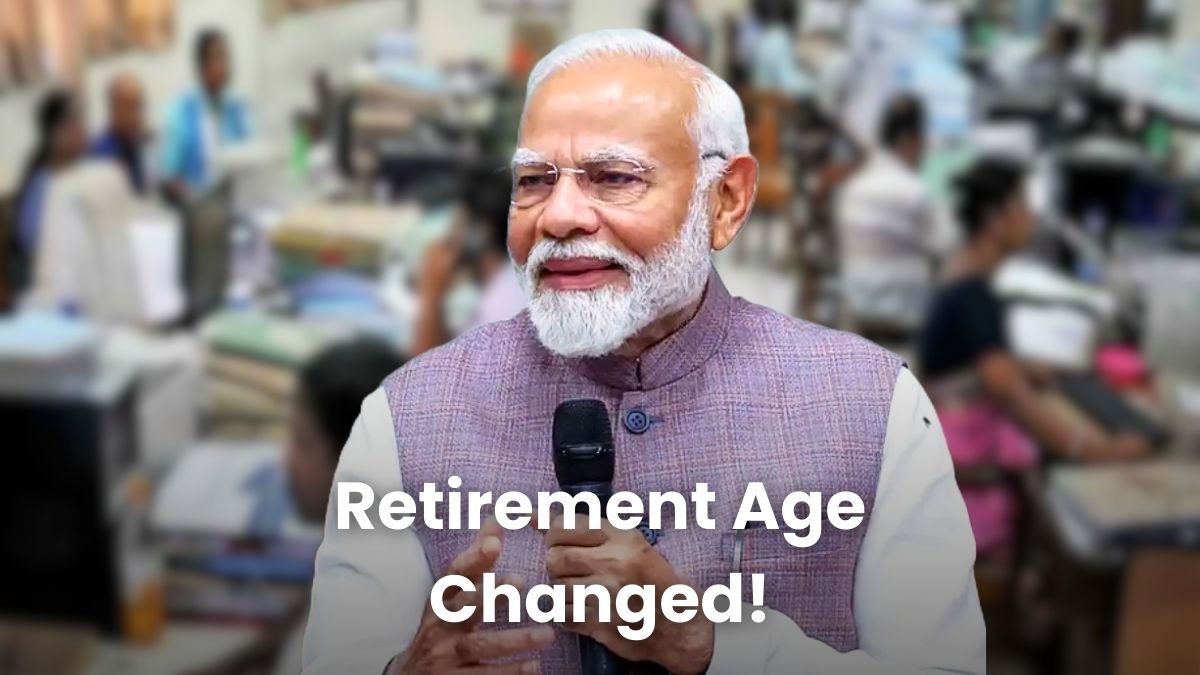Retirement Age Update – The Government of India has made a major change that’s going to affect a huge number of government and public sector employees starting in 2025. The retirement age has officially been revised, and this is a move that will have a lasting impact on jobs, promotions, pensions, and overall workforce planning across several departments. If you work for the government or in a PSU (Public Sector Undertaking), here’s everything you need to know in a clear and simple way.
Why Did the Government Change the Retirement Age?
Over the years, life expectancy in India has gone up, and people are staying healthier for longer. At the same time, there’s been an increasing demand for skilled and experienced people, especially in technical and administrative roles. To meet these changing times, the government decided it’s time to make the most of its existing talent. By raising the retirement age, they aim to retain experienced employees a little longer and reduce the pressure on the pension system in the short run.
This change is also in line with global practices – several countries have already raised their retirement ages as people live and work longer.
What’s New in the 2025 Retirement Policy?
Here are the big updates that have been announced:
- Central government employees will now retire at 62 years instead of 60.
- PSU employees will retire at 63 years, giving them an extra three years of service.
- Healthcare and technical staff in some departments will see their retirement age go up to 65 years.
- These new rules will be implemented in phases starting from July 2025.
- For now, no changes have been made for defense and paramilitary staff.
- The Voluntary Retirement Scheme (VRS) remains the same.
- Pension will now be calculated based on the latest pay commission, which could mean a better payout for retirees.
Who Does This Affect?
This update is going to directly impact over 1 crore employees – from doctors and teachers to engineers and clerical staff working under the central government or PSU units. For example:
- Central government workers: Now retire at 62 (was 60)
- PSU staff: Retirement age extended to 63
- Government doctors and healthcare workers: New retirement age is 65
- Professors and university staff: No change (they already retire at 65)
- Judiciary officials: Will also retire at 65 starting July 2025
State government employees may see changes too, but that will depend on each state’s decision.
What’s the Goal Behind This Change?
The government’s decision is focused on a few key things:
- Keeping experienced professionals on the job for longer
- Delaying pension payments to help manage government finances
- Bringing consistency in retirement ages across departments
- Improving employee morale by offering longer service tenure
- Addressing gaps in skilled professionals, especially in areas like healthcare and education
How Will This Affect Promotions and Hiring?
While the policy has clear benefits, there are also a few things to keep in mind:
- Slower Promotions: Since seniors will stay in service longer, younger employees may have to wait more for promotions.
- Fewer New Jobs (temporarily): Departments might slow down hiring for a while to control workforce size.
- Better Planning: Employees can now plan their finances, education goals for children, and retirement more easily with the extended tenure.
- Training for Older Staff: Organizations may now focus on training programs for senior staff to keep them up to date.
What Are Employees and Unions Saying?
The reactions are mixed, as expected.
- Many employees who are close to retiring are happy – they get more time in service and better pension benefits.
- Healthcare and education professionals welcome the change, saying their experience can now be used longer.
- On the flip side, junior staff and some trade unions are concerned. They say it could lead to career delays and fewer jobs for young applicants.
How Will This Impact Salaries and Pensions?
This decision will shift the financial dynamics in both short and long term:
- Monthly pensions will be delayed but might be a bit higher because of longer service.
- Government salary bills will increase as more people remain employed for longer.
- Fewer people may opt for early retirement through VRS, now that regular retirement has been extended.
What Should You Do Now?
If you’re a government or PSU employee, here’s how to stay prepared:
- Start reviewing your retirement and financial plans with the new age in mind.
- Learn about the revised pension calculations so there are no surprises later.
- Talk to your HR or department head about how this change will apply to you.
- Consider taking training courses or certifications to stay updated in your field.
The new retirement age policy for 2025 is a big step towards adjusting India’s workforce to today’s realities. It aims to make the most of experienced workers, reduce financial pressure on the government, and bring more consistency in employment policies. While there are challenges – especially for younger workers – this move reflects a long-term vision to build a more balanced and productive public workforce.
As always, employees should keep an eye out for official notices and updates. If you’re unsure how this affects you personally, reaching out to your HR department or checking with government portals will help you stay on track.




